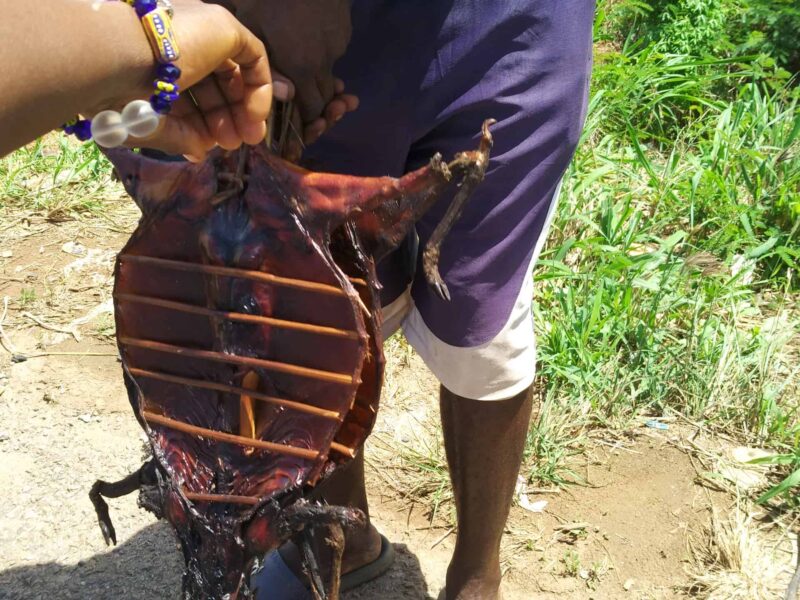Internews is pleased to announce that we have officially joined a new global consortium funded by the US government that seeks to identify, anticipate and mitigate threats posed by the “spillover” of dangerous pathogens from animals to humans.
The project, called “Strategies to Prevent Spillover,” or STOP Spillover, is made possible with a grant from the United States Agency for International Development (USAID) and will engage global experts on emerging infectious diseases and health information systems to identify and stop the potential spread of zoonotic diseases to humans. It plans to be active in up to 10 target countries, including Liberia, Uganda, Bangladesh, and Vietnam.
Since many of the vectors by which these diseases emerge depend on human interactions with wildlife and landscapes, Internews’ participation in the project is led by its Earth Journalism Network, which also serves as a professional association of over 13,000 journalists from more than 180 countries, in active collaboration with Internews’ Health program.
STOP Spillover will “play a significant role in the implementation of the U.S. Government’s Global Health Security Strategy, including support for the Global Health Security Agenda,” USAID has announced.
Tufts University leads the five-year, $100 million project in collaboration with a wide consortium of experts in human, animal and environmental health – and in ways to communicate the public about these issues – including the Africa and Southeast Asia One Health University Networks, Tetra Tech ARD, JSI Research and Training Institute and Internews.
“This project builds on the work of USAID’s Emerging Pandemic Threats program to understand dynamic infectious disease interfaces among animals, people, and the environment,” said Deborah Kochevar, the STOP Spillover program director who is based at Tufts University. “STOP Spillover broadens our interdisciplinary and interprofessional involvement to include veterinary, medical, nutrition, engineering, and global health diplomacy expertise.”
STOP Spillover will focus on several prioritized zoonotic viruses including Ebola, Lassa, Marburg, Nipah, animal-origin coronaviruses (including SARS, MERS-CoV, and SARS-CoV2), and animal-origin influenza viruses. The selection of these viruses is based on repeated, sporadic outbreaks with occasional epidemics or pandemics; the relatively low immunity and relatively high case fatality rates in human populations; the lack of specific and widely available biomedical countermeasures (e.g., medicines, vaccines); and the inability of countries to reliably reduce spillover, amplification, and spread of these viruses.
As a member of the consortium, Internews will strengthen local media capacities in explaining zoonotic diseases and how they spread, supporting solutions journalism to help prevent spillover, providing information and analysis and empowering journalists to better engage with their audience on these issues.
“COVID-19 has been devastating to the health and lives of millions across the world, yet there is a visible gap between scientific findings and what people know and understand about disease,” says Stella Paul, EJN’s Environment and Health Project Officer. “If we look at the mainstream media, most journalists have been learning about the disease while covering it, often at great personal risk and loss. Under the STOP Spillover program, Internews will provide local media in target countries with crucial information and understanding that will help them report more effectively on how to reduce amplification and spread of zoonotic pathogens.”
As a prelude to its interventions within the STOP Spillover program, EJN launched an online course April 20 on zoonotic diseases for journalists looking to better understand the science behind them, find available data on the subject and build skills in reporting on such an evolving topic. You can take the course or find out more about it here.
EJN also organized a webinar in the run-up to Earth Day that brought together Dennis Carroll, a renowned virologist and head of the Global Virome Project, and Robert Kessler, Communications Manager of EcoHealth Alliance, who shared insights and advice for journalists on how to effectively cover zoonotic diseases. Watch the recording.
As a consortium partner, Internews also participated in a webinar focused on gender where Stella Paul moderated a panel of scientists and gender experts to discuss the relevance and importance of gender analysis, gender integration and gender policy in the STOP Spillover program.
Visit STOP Spillover and subscribe to project updates.
